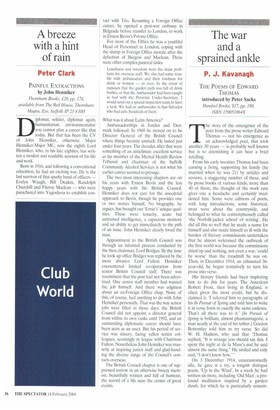A breeze with a hint of rain
Peter Clark
PAINFUL EXTRACTIONS by John Henniker Thorn ham Books, £20, pp. 174, available from The Red House, Thornham Magna, Eye, Suffolk IP 23 8 HH Diplomat, soldier, diplomat again, humanitarian, environmentalist: you cannot plan a career like that today. But that has been the CV of John Henniker, otherwise Major Henniker-Major MC, now the eighth Lord Henniker, who, in his late eighties, has written a modest and readable account of his life and work.
Born in 1916, and following a conventional education, he had an exciting war. He is the last survivor of that sparky band of officers — Evelyn Waugh, Bill Deakin, Randolph Churchill and Fitzroy Maclean — who were parachuted into Yugoslavia to establish con tact with Tito. Resuming a Foreign Office career, he opened a post-war embassy in Belgrade before transfer to London, to work in Ernest Bevin's Private Office.
For most of the Fifties he was a youthful Head of Personnel in London, coping with the slump in Foreign Office morale after the defection of Burgess and Maclean. There were other complex pastoral tasks:
Loneliness and boredom were the main problems for overseas staff. We also had some trouble with ambassadors and their fondness for drink or women — or men. In the event of rumours that the garden path was full of drink bottles, or that the Ambassador had been caught in bed with the Peruvian Under-Secretaiy, I would send out a special inspection team to have a look. We had an ambassador in San Salvador who had cats; hundreds of them.
What was it about Latin America?
Ambassadorships in Jordan and Denmark followed. In 1968 he moved on to be Director General of the British Council where things became unstuck. He lasted just under four years. The decades after that were something of an anticlimax: excellent service as lay member of the Mental Health Review Tribunal and chairman of the Suffolk Community Alcohol Services is not what his earlier career seemed to presage.
The two most interesting chapters are on his years with Ernest Bevin and the less happy years with the British Council. Henniker does not care for the anecdotal approach to Bevin, though he provides one or two stories himself. No biography, he argues, has brought out 'Ernie's' unique qualities. These were tenacity, acute but untrained intelligence, a capacious memory and an ability to get immediately to the pith of an issue. John Henniker clearly loved the man.
Appointment to the British Council was through an informal process conducted by the then chairman, Lord Bridges. By the time he took up office Bridges was replaced by the more abrasive Lord Fulton. Henniker encountered limited co-operation from senior British Council staff. There was resentment that the post had not been advertised. One senior staff member had wanted the job himself. And there was edginess about an ex-Foreign Office chap. None of this, of course, had anything to do with John Henniker personally. That was the way senior jobs were filled in those days: the British Council did not appoint a director general from within its own ranks until 1992, and an outstanding diplomatic career should have been seen as an asset. But his period of service was misery, facing sullen senior colleagues, seemingly in league with Chairman Fulton. Nonetheless John Henniker was masterly at inspiring junior staff and glad-handing the diverse range of the Council's contacts overseas.
The British Council chapter is one of suppressed sorrow in an otherwise breezy memoir, beautifully written and full of humour, the record of a life near the centre of great events.


































































 Previous page
Previous page